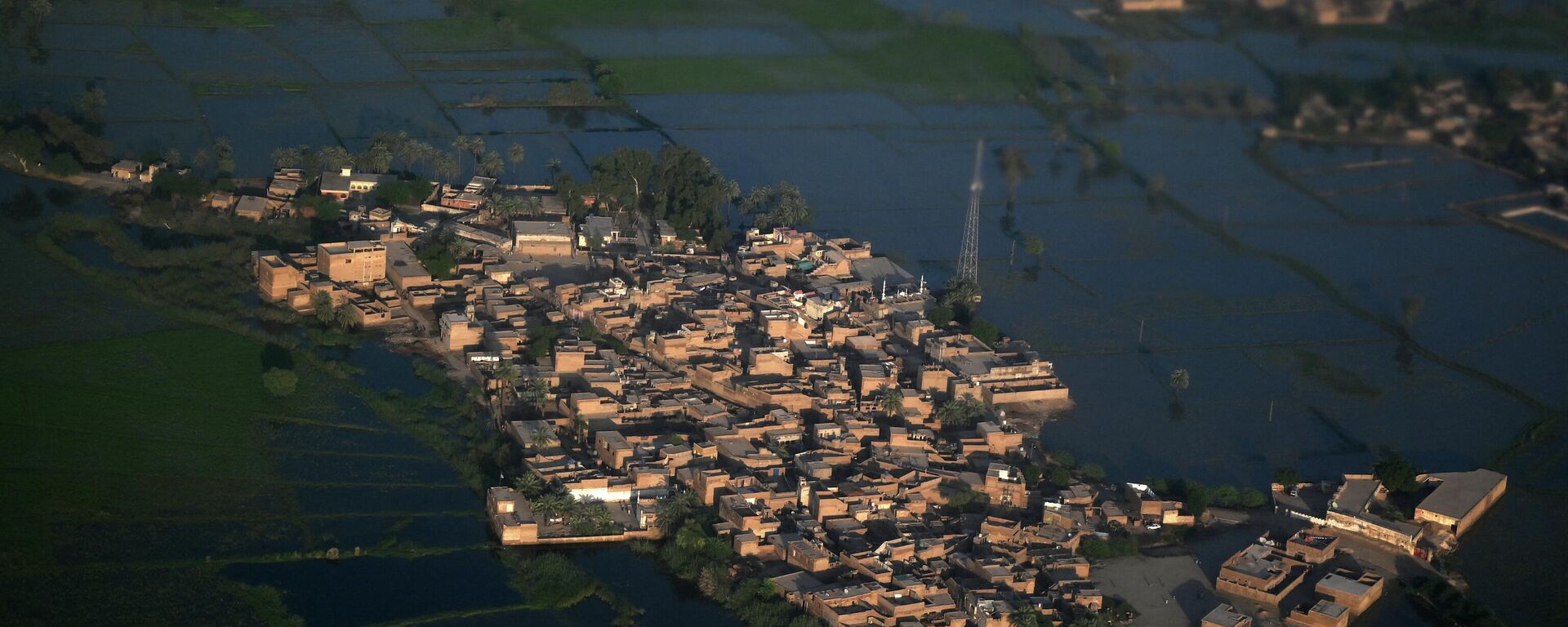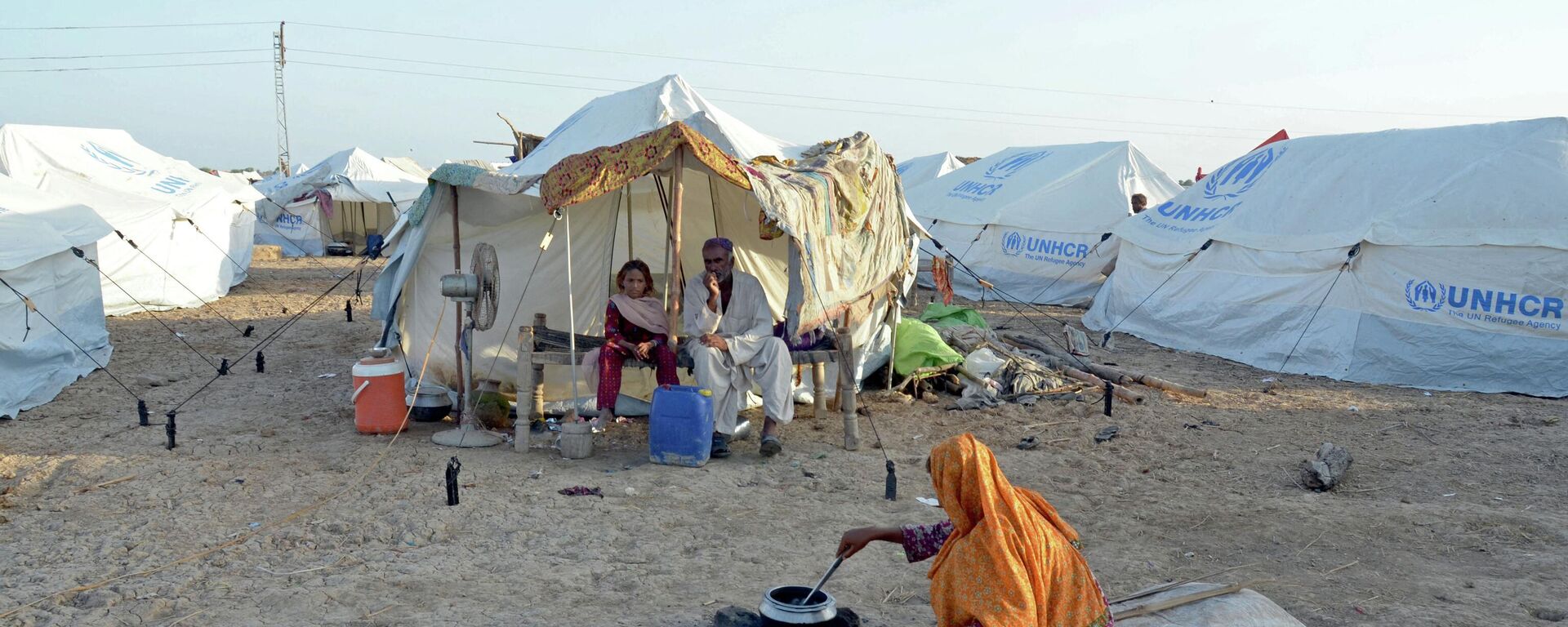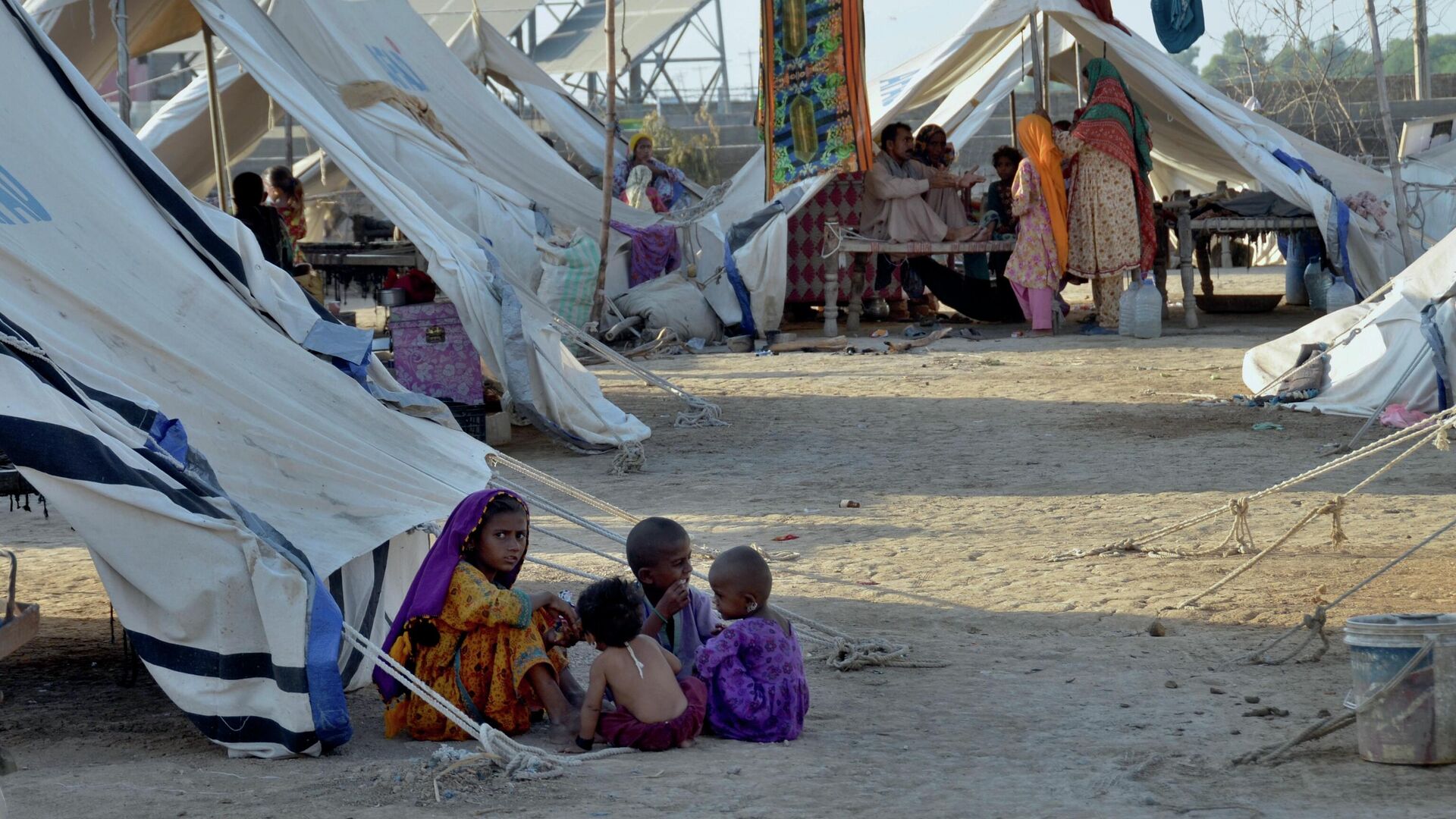https://sputnikglobe.com/20221011/sri-lanka-pakistan-among-54-most-debt-vulnerable-nations-in-need-of-urgent-relief-un-warns-1101707676.html
Sri Lanka, Pakistan Among 54 Most ‘Debt-Vulnerable’ Nations in Need of Urgent Relief, UN Warns
Sri Lanka, Pakistan Among 54 Most ‘Debt-Vulnerable’ Nations in Need of Urgent Relief, UN Warns
Sputnik International
The UN has said that the 54 debt-vulnerable nations account for more than half of the world’s population, but constitute less than 3 percent of the global... 11.10.2022, Sputnik International
2022-10-11T07:38+0000
2022-10-11T07:38+0000
2022-12-08T18:02+0000
world
sri lanka
united nations development programme (undp)
imf
shehbaz sharif
climate change
the united nations (un)
pakistan
https://cdn1.img.sputnikglobe.com/img/07e6/0a/0b/1101709243_0:254:3073:1982_1920x0_80_0_0_70c1c87ca0af2d81225bc762fcc54306.jpg
Sri Lanka and Pakistan have featured in a list of 54 low and middle-income nations which are “debt vulnerable” and in urgent need of relief from creditors, the United Nations Development Programme (UNDP) warned in a new paper released in Geneva.It also highlighted that 26 of the developing economies have debt levels which are considered either “substantial risk, extremely speculative or in default”. At the beginning of 2020, only 10 countries fell into any of the three categories.The UN paper noted that the “investors’ appetite” in these countries has been decreasing, with cumulative outflows from emerging markets being $50Bln, according to statistics reported by the International Monetary Fund (IMF) in August this year.The paper suggested that the emerging economies could be helped out of debt by better creditor coordination under the G20 Common Framework (CF) among Paris Club and non-Paris Club nations, particularly China. The Paris Club is an informal group comprising officials from 23 advanced economies or creditor nations.UNDP chief Achim Steiner said that providing debt relief would be a “small pill to swallow” for the wealthy creditor nations.Cases of Sri Lanka & PakistanSri Lanka has been facing its worst economic crisis for more than seven decades, spurred by a balance of payments (BoPs) crisis caused by depleting foreign exchange reserves. The country defaulted on its foreign debt repayments in April.The economic crisis has also resulted in the government being unable to pay for essential food and fuel imports, thus triggering runaway inflation which topped 70 percent in August.Although the Sri Lankan government last month sealed a staff-level agreement with the IMF for a $2.9Bln bail-out package, the disbursement of funds under the deal is dependent on Sri Lanka’s foreign creditors agreeing to restructure the foreign debt.The Sri Lankan government is at present involved in efforts to convene a creditors’ conference of Paris Club and non-Paris Club nations to reach a consensus on restructuring foreign debt.The new UNDP paper noted that Colombo’s foreign currency (FC) denominated bond debt was trading at a historic low of 27 cents to the dollar as a result of the economic crisis.In the case of Pakistan, the UN agency has expressed concern over the downgrading of its average credit rating to 6 (highly speculative) this year. The gross public debt of Pakistan is 74 percent of the country’s Gross Domestic Product (GDP).Further, the paper said that 6 percent of Pakistan’s population has been living in “extreme poverty” and the country ranks 147 among 182 countries on "climate change vulnerability".Pakistan has also been facing a situation of depleting forex reserves and unprecedented inflation, which reached 27 percent in August. Pakistan’s Prime Minister Shehbaz Sharif warned last month that the government was in urgent need of “debt relief” as overall damage caused by floods exceeded $30Bln.
https://sputnikglobe.com/20221004/un-raises-red-flag-over-threat-of-food-crisis-for-57-million-pakistani-flood-survivors-1101472721.html
https://sputnikglobe.com/20221006/wont-take-begging-bowl-pakistan-demands-richer-nations-pay-for-climate-change-induced-flooding-1101568768.html
sri lanka
pakistan
Sputnik International
feedback@sputniknews.com
+74956456601
MIA „Rossiya Segodnya“
2022
News
en_EN
Sputnik International
feedback@sputniknews.com
+74956456601
MIA „Rossiya Segodnya“
Sputnik International
feedback@sputniknews.com
+74956456601
MIA „Rossiya Segodnya“
sri lanka, united nations development programme (undp), imf, shehbaz sharif, climate change, the united nations (un), pakistan
sri lanka, united nations development programme (undp), imf, shehbaz sharif, climate change, the united nations (un), pakistan
Sri Lanka, Pakistan Among 54 Most ‘Debt-Vulnerable’ Nations in Need of Urgent Relief, UN Warns
07:38 GMT 11.10.2022 (Updated: 18:02 GMT 08.12.2022) The UN has said that the 54 debt-vulnerable nations account for more than half of the world’s population, but constitute less than 3 percent of the global Gross Domestic Product (GDP). According to a new UN report, 46 of the 54 countries have accrued public debt totaling $782Bln in 2020.
Sri Lanka and Pakistan have featured in a list of 54 low and middle-income nations which are “debt vulnerable” and in urgent need of relief from creditors, the United Nations Development Programme (UNDP) warned in a new paper released in Geneva.
The UN agency said that the “risks of inaction are dire” and could lead to increasing poverty levels and lack of access to “desperately needed investments” in climate adaption and mitigation. The 54 most debt-vulnerable countries include 28 of the world’s top-50 most climate vulnerable nations, the paper says.
It also highlighted that 26 of the developing economies have debt levels which are considered either “substantial risk, extremely speculative or in default”. At the beginning of 2020, only 10 countries fell into any of the three categories.
The UN paper noted that the “investors’ appetite” in these countries has been decreasing, with cumulative outflows from emerging markets being $50Bln, according to statistics reported by the International Monetary Fund (IMF) in August this year.
The paper suggested that the emerging economies could be helped out of debt by
better creditor coordination under the G20 Common Framework (CF) among Paris Club and non-Paris Club nations, particularly China. The Paris Club is an informal group comprising officials from 23 advanced economies or creditor nations.
“Fundamentally, the paper argues that the focus must shift from debt rescheduling to comprehensive restructuring involving write-offs allowing countries a faster return to growth, financial markets and development progress,” the UNDP said.

4 October 2022, 15:17 GMT
UNDP chief Achim Steiner said that providing debt relief would be a “small pill to swallow” for the wealthy creditor nations.
“We cannot afford to repeat the mistake of providing too little relief, too late, in managing the developing economy debt burden,” Steiner cautioned.
Cases of Sri Lanka & Pakistan
Sri Lanka has been facing its worst economic crisis for more than seven decades, spurred by a balance of payments (BoPs) crisis caused by depleting foreign exchange reserves. The country defaulted on its foreign debt repayments in April.
The economic crisis has also resulted in the government being unable to pay for essential food and fuel imports, thus triggering runaway inflation which topped 70 percent in August.
Although the Sri Lankan government last month sealed a staff-level agreement with the IMF for a $2.9Bln bail-out package, the disbursement of funds under the deal is dependent on Sri Lanka’s foreign creditors agreeing to restructure the foreign debt.
The Sri Lankan government is at present involved in efforts to convene a creditors’ conference of Paris Club and non-Paris Club nations to reach a consensus on restructuring foreign debt.
The new UNDP paper noted that Colombo’s foreign currency (FC) denominated bond debt was trading at a historic low of 27 cents to the dollar as a result of the economic crisis.

6 October 2022, 12:10 GMT
In the case of Pakistan, the UN agency has expressed concern over the downgrading of its average credit rating to 6 (highly speculative) this year. The gross public debt of Pakistan is 74 percent of the country’s Gross Domestic Product (GDP).
Further, the paper said that 6 percent of Pakistan’s population has been living in “extreme poverty” and the country ranks 147 among 182 countries on "climate change vulnerability".
Pakistan has also been facing a situation of depleting forex reserves and unprecedented inflation, which reached 27 percent in August. Pakistan’s Prime Minister Shehbaz Sharif
warned last month that the government was in urgent need of “debt relief” as overall damage caused by floods exceeded $30Bln.




